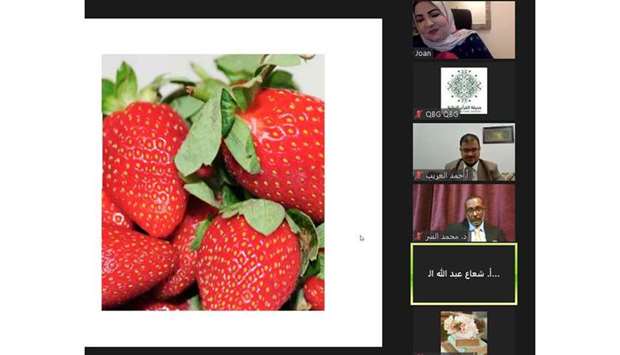Qatar Foundation's Qur’anic Botanic Garden (QBG) has hosted an online discussion titled ‘The Importance of Local Initiatives for Plant Conservation and Food Security’.
The interactive session, moderated by renowned Qatar Radio anchor Buthaina Abdul Jalil, featured QBG research assistant Ahmed El-Gharib and several other environmental experts from around Qatar.
They shared their expertise and experiences in plant cultivation, agriculture, and biodiversity. Other discussion topics included the conservation and propagation of fungal plants, home farming, and the importance of food security initiatives.
One of the guest speakers in the event, Shuaa Abdullah Al-Sada, botanical researcher and author of the book ‘Gardening in Arabia: Fruiting Plants in Qatar and the Arabian Gulf’, discussed her experience in tree, perennial, and medicinal plant cultivation and how they can be grown in home conditions. She also detailed the plant varieties that can be cultivated in Qatar’s high heat and humidity ecological conditions.
Maryam al-Dosari, founder and director of the Gharsa home gardening initiative, addressed the important role that local initiatives play in plant conservation and food security, and the role of the Gharsa initiative in particular, when it comes to spreading agricultural knowledge among women and empowering women to cultivate.
Other themes that she discussed included home agricultural production, the long-term preservation of food, and achieving domestic self-sufficiency on an individual home basis. The Gharsa initiative focuses on these themes through dedicated training programs, meetings, the exchange of seedlings and seeds, as well as agricultural materials to enable women’s agricultural success. Members of the initiative have achieved high rates of self-sufficiency of dates, lemons, and seasonal vegetables.
Dr. Mohamed Elsir Ahmed Awaad, Agricultural Affairs Department, Ministry of Municipality and Environment, said: ‘We would like to thank QBG for organising this fruitful event and sincerely hope that such seminars will be organised in the future. In addition, we would like to commend the efforts of all Qatari farm owners, who have played a pivotal role in the increase of vegetable production to meet the State of Qatar’s needs, with the percentage of self-sufficiency of locally grown vegetables, such as tomatoes and cucumbers well exceeding 100%. In the near future, we hope to significantly increase this percentage, particularly over the summer period.’
Commenting on the webinar, Fatima al-Khulaifi, director, QBG, expressed delight in having brought together some of Qatar’s most important stakeholders to discuss these important environmental topics.
‘As part of our bid to support Qatar’s sustainable development and the UN SDGs, we regularly host events, seminars, workshops, and exhibitions that enable the public to engage with well-respected environmental experts.
‘In line with this, we brought together experts from across Qatar to share their expertise with one another, as well as the wider community, which helps raise awareness of the pressing need to protect the environment through plant conservation, home farming, and food security initiatives.’
Additionally, in a bid to support the Environmental Development pillar of Qatar National Vision 2030, protect ecosystems, and empower community members to be active contributors to these efforts, QBG recently launched its free-of-charge ‘Home Garden Phone Helpline’. The initiative enables the public to pose any home gardening questions directly to QBG experts by calling 3091 8519 every Monday from 9am – 12.30pm, and every Wednesday from 12.30pm – 2.30pm.
More information on its upcoming events, competitions, and activities can be found on its social media channels on Instagram: Quranic_Botanic_Garden; Facebook: Qur'anic Botanic Garden; and Twitter: @QuranicGarden.

